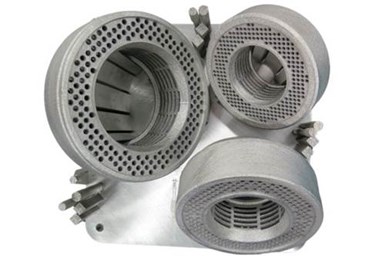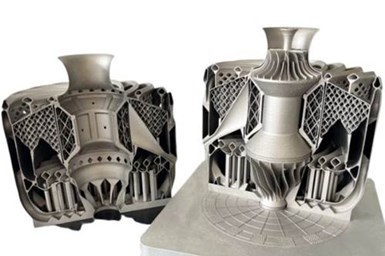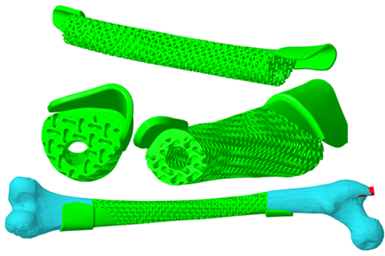Meet The Cool Parts Showcase Winners
The Cool Parts Showcase winners for 2023 were announced at Formnext Forum Austin. Watch the award presentation here.
Share
The Cool Parts Showcase winners for 2023 were announced at Formnext Forum Austin. Watch the award presentation above.
Meet the Winners

Best Production Part: Variable Resistance Trim Stack
This variable resistance trim (VRT) stack sits inside a valve body where an actuated plug travels up and down to control the amount of flow through the stack. These valve trim components were conventionally manufactured as a stack of plates with drilled holes that had to be brazed together and machined. Converting the portfolio of VRT stacks to 3D printed 718 alloy (printed with laser powder bed fusion) has enabled Baker Hughes to reduce lead time, manufacture complex internal geometries and consolidate parts for supply chain simplicity. More than 60 VRTs have been delivered in 21 unique designs.

Best Proof-of-Concept: Pre-Assembled Turbojet Engine
This turbojet engine jointly developed by Technion – Israel Institute of Technology and PTC, in collaboration with von Karman Institute for Fluid Dynamics and Izmir Katip Celebi University, was produced in a single uninterrupted print. The gas turbine includes only two major parts: a static casing with an embedded combustion chamber and a rotating shell structure. Printing the engine as one helps to reduce manufacturing complexity and supply chain dependency, plus minimize the cost of production. Concept demonstrators were 3D printed using EOS M290/M300 printers from Inconel 718.

Best Bespoke Solution: Femur Implant with Lattices
Developed by Advanced Engineering Solutions in the framework of a strategic partnership between PTC and Levin Center for 3D Printing and Surgical Innovation at The Tel Aviv Sourasky Medical Center (Ichilov Hospital), Israel. This femur implant is a bespoke solution for a patient with bone cancer requiring clinical intervention. The lattice design promotes osseointegration and is driven by the structural simulation to preserve the structural integrity of the patient’s weight and avoid stiffness discontinuities. The part integrates anti-torsional brackets and accommodates the FDA-approved cephalomedullary nailing system. The implant was designed under the leadership of Dr. Solomon Dadia (Ichilov Hospital) and Dr. Andreas Vlahinos (AES), using PTC Creo Additive Manufacturing solutions. It is in the design refinement stage and will be printed from titanium alloy using laser powder bed fusion with an EOS M290.
Related Content
-
8 Cool Parts From Formnext 2023: The Cool Parts Show #65
New additive manufacturing technologies on display at Formnext were in many cases producing notable end-use components. Here are some of the coolest parts we found at this year’s show.
-
Semiconductors, Tungsten, AM Affordability and More from Formnext 2024: AM Radio #56
The trade show included increased applications for the semiconductor market, machine launches and technology advances aimed at cost cutting, plenty of LFAM and more. Listen to our conversation on Formnext 2024.
-
Assonic Develops Automated System for Processing Reactive Metal Powders Without Gas Loss
Formnext 2024: The Assonic SPC 500 system features a closed circuit for conveying both powder and gas to eliminate gas loss while processing reactive metal powders in additive manufacturing.





